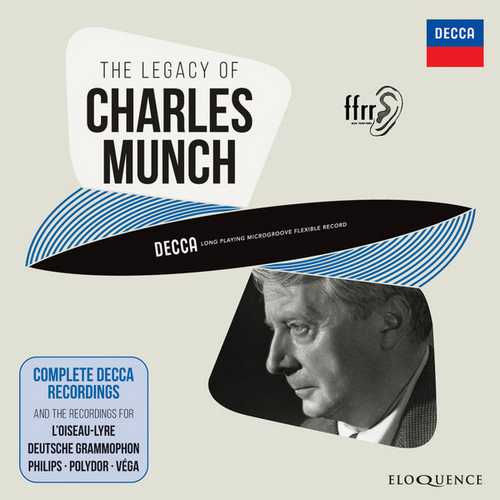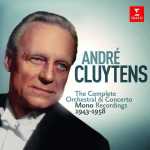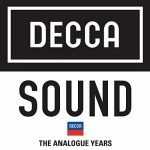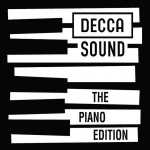
Composer: Henry Barraud, Ludwig van Beethoven, Hector Berlioz, Georges Bizet, Johannes Brahms, Claude Achille Debussy, Gabriel Urbain Fauré, César Auguste Franck, Franz Joseph Haydn, Vincent d’Indy, Felix Mendelssohn, Wolfgang Amadeus Mozart, Jacques Offenbach, Sergei Prokofiev, Maurice Ravel, Ottorino Respighi, Albert Roussel, Charles Camille Saint-Saëns, Robert Schumann, Pyotr Il’yich Tchaikovsky, Charles-Marie Jean Albert Widor
Performer: Jacqueline Blancard, Marcelle Herrenschmidt, Roland Charmy, André Navarra, Myrtil Morel, Fernand Oubradous, Ossy Rennardy, Eileen Joyce, Nicole Henriot, Peter Schreier
Orchestra: Orchestre de la Société Philharmonique de Paris, L’Orchestre de la Société des Concerts du Conservatoire de Paris, London Philharmonic Orchestra, Concertgebouworkest, New Philharmonia Orchestra, Symphonieorchester des Bayerischen Rundfunks, Hungarian Radio And Television Orchestra, Symphonie-Orchester des Bayerischen Rundfunks
Conductor: Charles Munch
Number of Discs: 14
Format: FLAC (tracks)
Label: Decca
Release: 2020
Size: 3.31 GB
Recovery: +3%
Scan: cover
01. Ravel: Piano Concerto in D major (for the left hand)
02. Widor: Fantaisie pour piano et orchestre en la bémol majeur, Op.62
Haydn: Sinfonia Concertante in B flat major, Op. 84, Hob. I / 105
03. 1. Allegro
04. 2. Andante
05. 3. Allegro con spirito
Mozart: Adagio & Fugue in C minor for Strings, K546
06. 1. Adagio
07. 2. Fugue
Beethoven: Symphony No. 8 in F major, Op. 93
08. 1. Allegro vivace e con brio
09. 2. Allegretto scherzando
10. 3. Tempo di menuetto
11. 4. Allegro vivace
Mendelssohn: Symphony No. 5 in D Minor, Op. 107, MWV N 15 “Reformation”
12. 1. Andante – Allegro con fuoco
13. 2. Allegro vivace
14. 3. Andante
15. 4. Choral “Ein’ Feste Burg ist unser Gott!”
16. Berlioz: Overture “Benvenuto Cellini”, Op. 23
Berlioz: Roméo et Juliette, Op. 17, H 79 / Pt. 2
17. Roméo seul – Tristesse – Concert et bal.
Berlioz: Roméo et Juliette, Op. 17, H 79 / Pt. 3
18. Scène d’amour
Berlioz: Roméo et Juliette, Op. 17, H 79 / Pt. 2
19. Scherzo. La Reine Mab
Berlioz: Les Troyens, H 133 / Act 4
20. No. 29 Chasse Royale et Orage – Pantomime
21. Berlioz: Overture “Le Corsaire”, H 101
Schumann: Symphony No. 4 in D minor, Op. 120
22. 1. Ziemlich langsam – Lebhaft
23. 2. Romanze. Ziemlich langsam
24. 3. Scherzo
25. 4. Langsam – Lebhaft – Schneller – Presto
Brahms: Violin Concerto in D major, Op. 77
26. 1. Allegro non troppo
27. 2. Adagio
28. 3. Allegro giocoso, ma non troppo vivace – Poco più presto
29. Franck: Symphonic Variations for piano & orchestra, M46
Franck: Symphony in D minor
30. 1. Lento – Allegro ma non troppo – Allegro
31. 2. Allegretto
32. 3. Allegro non troppo
33. Saint-Saëns: Le Rouet d’Omphale, Op. 31
34. Saint-Saëns: Danse macabre, Op. 40
Bizet: Symphony in C
35. 1. Allegro vivo
36. 2. Adagio
37. 3. Scherzo. Allegro vivace
38. 4. Finale. Allegro vivace
Bizet: La jolie fille de Perth (Suite)
39. 4. Danse bohémienne
Fauré: Pelléas et Mélisande (Suite), Op. 80
40. 1. Prélude
41. 2. Fileuse
42. 3. Sicilienne
43. 4. La mort de Mélisande
44. Fauré: Pavane, Op. 50
Indy: Fervaal, Op. 40
45. Prélude
Prokofiev: Symphony No. 1 in D major, Op. 25 ‘Classical’
46. 1. Allegro
47. 2. Larghetto
48. 3. Gavotta. Non troppo allegro
49. 4. Finale. Vivace
Tchaikovsky: Symphony No. 6 in B minor, Op. 74 ‘Pathétique’
50. 1. Adagio – Allegro non troppo
51. 2. Allegro con grazia
52. 3. Allegro molto vivace
53. 4. Finale. Adagio lamentoso – Andante
Debussy: Images for orchestra: II. Ibéria
54. I. Par les rues et par les chemins
55. II. Les parfums de la nuit
56. III. Le matin d’un jour de fête
57. Debussy: Berceuse héroïque
Roussel: Petite Suite Op. 39
58. 1. Aubade
59. 2. Pastorale
60. 3. Masquerade
Roussel: Le festin de l’araignée (Fragments symphoniques), Op. 17
61. 1. Prélude
62. 2. Entrée des fournis
63. 3. Danse du papillon
64. 4. Eclosion de l’éphémère
65. 5. Danse de l’éphémère et des chenilles
66. 6. Funérailles de l’éphémère
67. 7. La nuit tombe sur le jardin solitaire
Roussel: Suite in F major, Op. 33
68. 1. Prélude
69. 2. Sarabande
70. 3. Gigue
Ravel: Piano Concerto in G major
71. 1. Allegramente
72. 2. Adagio assai
73. 3. Presto
Ravel: Daphnis et Chloé, Suite No. 1
74. 1. Nocturne
75. 3. Danse guerrière
Ravel: Daphnis et Chloé – Suite No. 2
76. 1. Lever du jour
77. 2. Pantomime
78. 3. Danse générale
79. Ravel: Boléro
Offenbach: Gaîté Parisienne
80. Overture
81. Allegro brillante
82. Polka
83. Ländler (Allegro)
84. Mazurka (Allegro)
85. Valse
86. (Allegro)
87. Polka (2)
88. Valse lente
89. Tempo di marcia
90. Valse (2)
91. Allegro vivo – Valse
92. Allegro
93. Valse (3)
94. Allegro – Cancan
95. Quadrille – Cancan
96. Allegro moderato
97. Allegro (2)
98. Leggiero
99. Vivo
100. Barcarolle
Bizet: Carmen Suite (Excerpts from Suites Nos. 1 & 2)
101. Les toréadors
102. Aragonaise
103. Intermezzo
104. Les dragons d’Alcala
105. Habanera
106. La garde montante
107. Danse bohème
Respighi: Pines of Rome
108. The Pines of Villa Borghese
109. The Pines near a Catacomb
110. The Pines of the Janiculum
111. The Pines of the Appian Way
Respighi: Fountains of Rome
112. The Fountain of Valle Giulia at Dawn
113. The Triton Fountain at Morning
114. The Fountain of Trevi at Midday
115. The Villa Medici Fountain at Sunset
Bizet: L’Arlesienne Suite No. 1
116. Prélude
117. Minuetto
118. Adagietto
119. Carillon
Bizet: L’Arlésienne Suite No. 2
120. Farandole
Barraud: Symphonie n 3
121. I. Pesante e marcato
122. II. Presto
123. III. Adagio
124. IV. Energetico
Roussel: Bacchus et Ariane, Op. 43 – Suite No. 2
125. I. Prélude. Ariane dort – Réveil d’Ariane
126. II. Elle regarde avec étonnement de tous côtés
127. III. Le baiser – L’enchantement dionysiaque
128. IV. Danse d’Ariane et de Bacchus – Bacchanale – Le couronnement d’Ariane
Berlioz: Symphonie fantastique, Op. 14
129. 1. Rêveries – Passions. Largo – Allegro agitato e appassionato assai – Religiosamente
130. 2. Un bal. Valse. Allegro non troppo
131. 3. Scène aux champs. Adagio
132. 4. Marche au supplice. Allegretto non troppo
133. 5. Songe d’une nuit de sabbat. Larghetto – Allegro
Berlioz: Grande Messe des Morts, Op. 5 (Requiem)
134. 1. Requiem – Kyrie
135. 2. Dies irae – Tuba mirum
136. 3. Quid sum miser
137. 4. Rex tremendae
138. 5. Quaerens me
139. 6. Lacrymosa
140. 7. Domine Jesu Christe
141. 8. Hostias
142. 9. Sanctus
143. 10. Agnus Dei
The inspirational French maestro on disc: an unrivalled retrospective, covering three decades of incandescent music-making, including recordings new to CD and long unavailable, newly remastered and comprehensively documented. In the memories of most record-buyers, Charles Munch was indelibly and almost exclusively associated with the RCA label, thanks to a string of spectacular albums made during his thirteen-year-long tenure as Music Director of the Boston Symphony Orchestra. From telecasts of that era too is fixed the image of the white-haired, square-jawed maestro urging on his Boston musicians to ever greater heights of intensity with gestures of both elemental passion and delicious legerdemain. These qualities were also present, however, in the recordings made by Munch for several other labels throughout his career. They have now been brought together by Eloquence in a set that offers the most rounded portrait yet of the conductor throughout his career. His earliest recordings were made in Paris for Polydor and for LOiseau-Lyre in 1938, of concertante works by Ravel, Widor (the rarely heard Fantasie for piano and orchestra) and Haydn: these have been newly transferred from original masters by Mark Obert-Thorn. From the beginning of his postwar contract with Decca come London-made recordings of French repertoire (Berlioz, Bizet, Debussy, Faur, Franck, Ravel, Roussel, Saint-Sans) and Austro-German symphonies (Beethoven 8, Mendelssohn 5, Schumann 4), conducting the orchestra of the Socit des Concerts du Conservatoire de Paris which he had led since 1939. In these performances, sustained throughout by a sweeping legato line, we may recall Munchs insistence that To be a conductor is not a mtier but rather a sacred rite. This is no less true of a ragged but thrilling Pathtique Symphony from 1948, now recorded in Paris. After the Boston years, Munch struck up a partnership with the New Philharmonia Orchestra (196557), which yielded albums of Bizet, Offenbach and Respighi in which the conjurors magic fire remained undimmed. He also returned with them to a suite from Roussels Bacchus et Ariane ballet which was always a Munch favourite in concert. His last studio account from Budapest in 1966 of the Symphonie fantastique is also here, having appeared on Fidelio, Hungaroton and Philips, but long unavailable. The set concludes with more Berlioz Munchs sole recording for Deutsche Grammophon, of the Grande messe des morts. This was made in Munich in 1967, the year before his death, and is a moving testament to the conductors career-long dedication to realizing the most original orchestral and acoustic possibilities explored by a composer who, like Munch himself, always went his own way. A wonderful piece of playing, back up by superb recording which captures every detail of the large score and yet maintains a true overall perspective and fidelity. Gramophone, February 1950 (Berlioz: excerpts from Romo et Juliette) Munchs second recording of Berliozs setting of the Requiem Mass resonates to a vision recognising that the devil is in the quiet detail, and that (paradoxically) intimacy triumphs. BBC Music magazine, January 2012 (Requiem) Even the often-staid Scne aux champs is fraught with nervous energy. Munch is on far more freewheeling, maniacal form than in his inspired-enough Boston Symphony studio recordings. Classics Today, January 2006 (Symphonie fantastique) The orchestral playing is vivid in the extreme Munch plays both suites for all theyre worth and all the big moments are brilliantly contrived. Gramophone, August 1976 (Respighi) A special tribute, in reviewing this outstanding recording, should go to Charles Munch, not only for his beautiful orchestral accompaniment, but for the sense of direction and authority that he has so obviously impressed upon the whole performance. Gramophone, September 1947 (Franck: Variations symphoniques).



